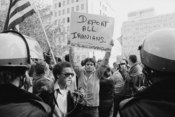Jimmy Carter's Attempt to End the Iran Hostage Crisis
Adam Fink
Advanced Placement United States History
Period 1
Ms. Lentz
3/11/14
The actions of few can have lasting implications on the futures of others. The Iranian Hostage Crisis was a defining event that drove a wedge between Iran and American politics, a divide that is still present today. President Jimmy Carter, who was already quite unpopular, was faced with the difficult task of having to deal with the rebellious Iranian people. Although he had good intentions, President Carter acted inappropriately in response to the Iran Hostage Crisis by failing to make diplomatic relations, enacting weak economic policies, and refusing to take military action. His actions during this crisis dealt the final blow to his popularity, which ultimately led to his defeat in the election of 1980.
The Iran Hostage Crisis was a result of the United States' (US) involvement in the Iranian Revolution (Kirkendall 1).
The election of Mohammed Mossadegh in 1951 as Prime Minister put America in a precarious situation. Mossadegh wanted to nationalize Iran's oil industry, in which both America and Great Britain had major holdings (The Associated Press 1). To protect their investments, the two nations led a coup d'état to depose Mossadegh and install pro-west Mohammed Reza Pahlavi as Shah in 1953. The United States reaped massive benefits from their access to Iranian oil, while aiding the Shah is westernizing and militarizing Iran (Kirkendall 1). The conservative Shiite Muslim population of Iran detested these changes and the Shah's oppressive police, the SAVAK. The previously exiled Shiite leader, the Ayatollah Ruholla Khomeini, returned to Iran to incite a revolution among the people ("The Jimmy Carterâ¦" 1). The Shah, dying of cancer, was offered asylum in the United States. Iranians were outraged, so they rioted outside the...


